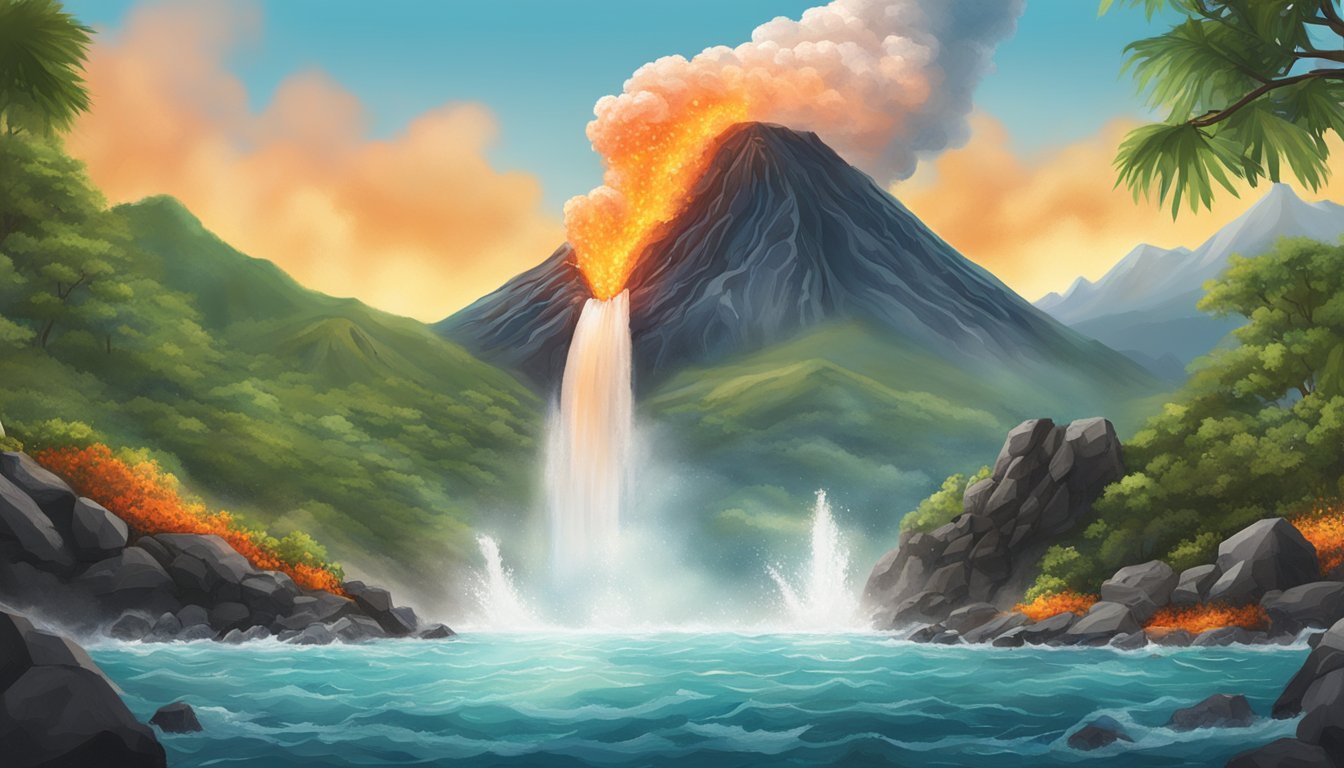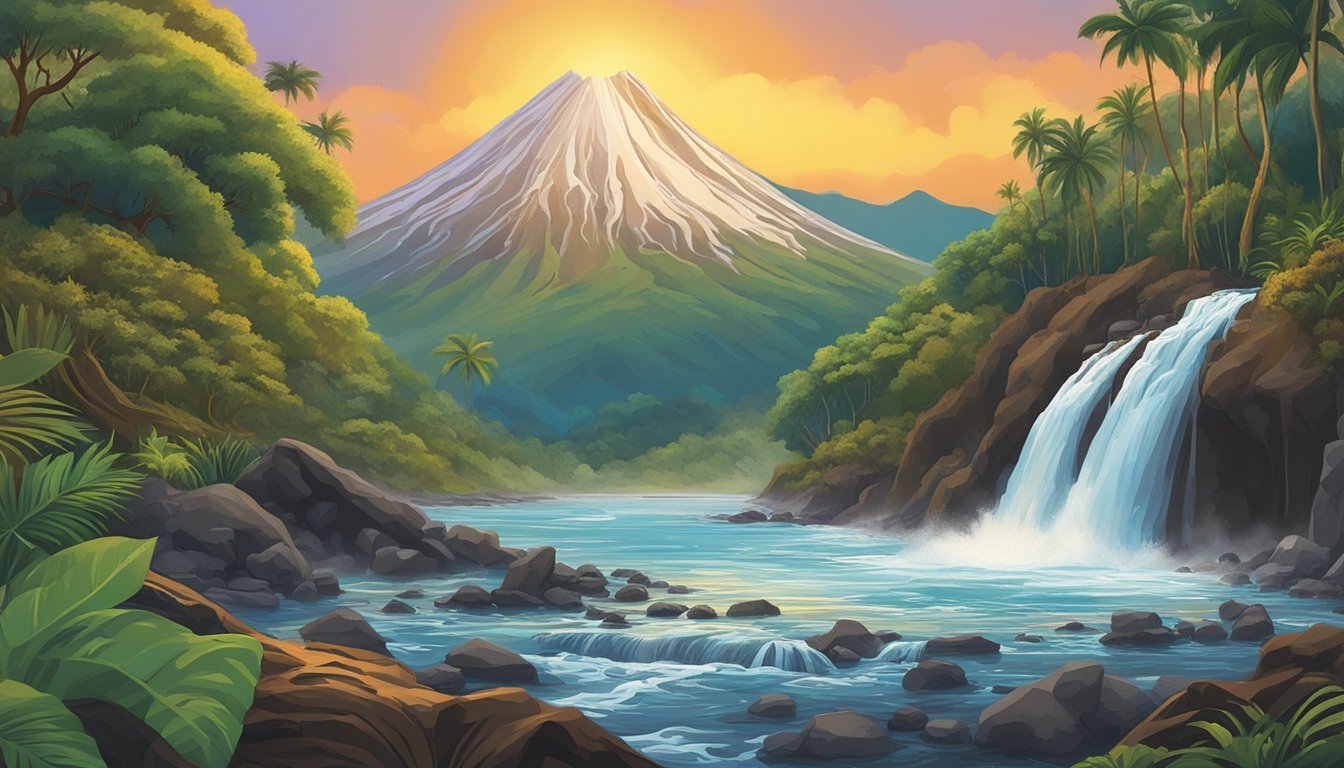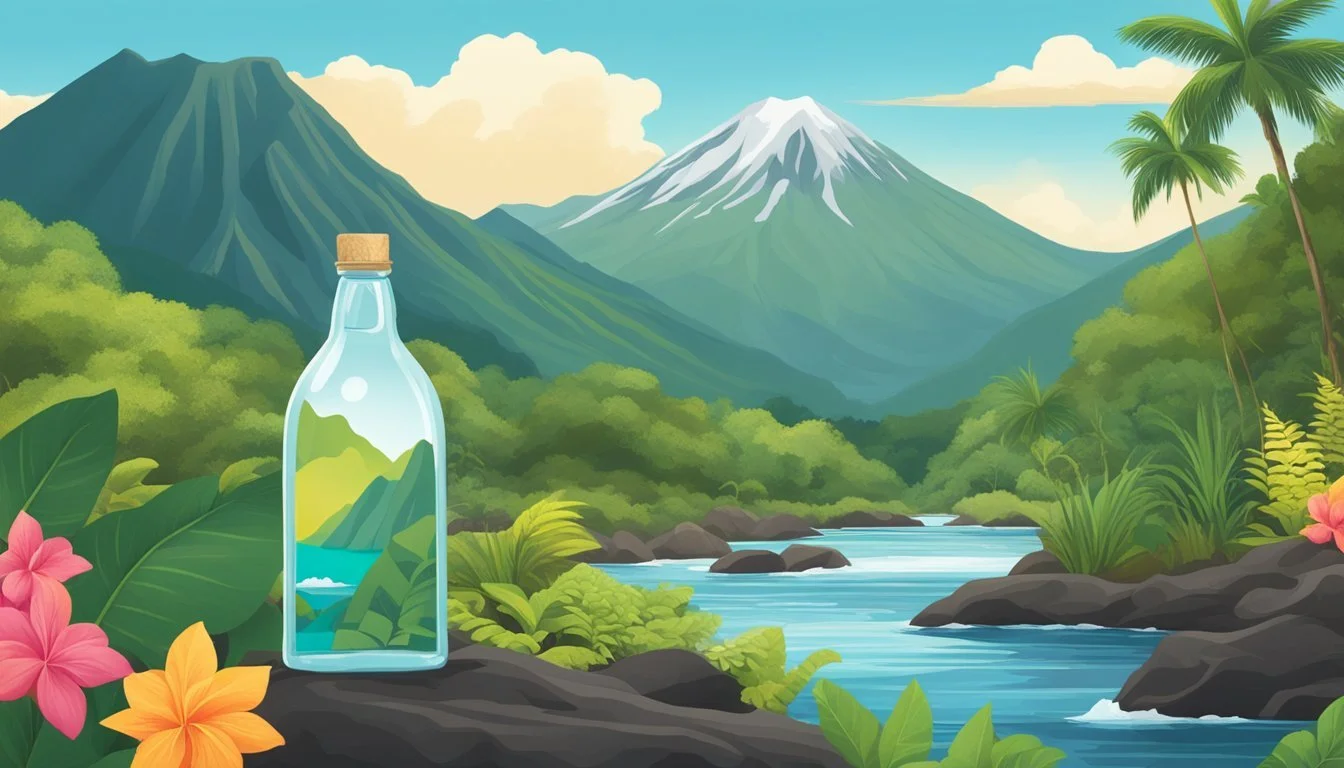Hawai’i Volcanic vs. Cascade Mountain
A Bottled Water Comparison
When it comes to choosing the best bottled water, two standout contenders are Hawai’i Volcanic and Cascade Mountain. Both brands offer unique qualities that appeal to a wide range of preferences. Whether it's the alkaline properties or the rich mineral content, each brings something special to the table.
Hawai’i Volcanic boasts a naturally alkaline pH, ranging between 7.6 and 8.2, making it one of the most alkaline waters available. This alkalinity is achieved as the water filters through volcanic rocks, enriching it with minerals like silica, which has potential health benefits for bones, skin, hair, and nails.
Cascade Mountain offers a crisp, refreshing taste that has earned it high marks among bottled water enthusiasts. Its purity and clean flavor make it a favorite, especially for those who enjoy a straightforward, mineral-balanced water. Choosing between Hawai’i Volcanic and Cascade Mountain ultimately comes down to personal preference and specific health benefits.
Understanding Bottled Water
Bottled water comes in various types, each with unique characteristics influencing taste, health benefits, and suitability for different uses.
Types of Bottled Water:
Natural Spring Water: Sourced from natural springs, it retains the minerals found at the source.
Purified Water: Treated to remove impurities, it is often sourced from municipal supplies.
Sparkling Water: Contains carbon dioxide for effervescence, offering a fizzy experience.
Premium Water: Premium bottled waters often boast exceptional purity, unique mineral content, or distinctive sourcing methods. These attributes typically justify their higher price points.
Alkaline Water: Known for its higher pH level, alkaline water ranges above 7 on the pH scale. It is believed to help neutralize acidity in the body, contributing to overall wellness. Examples include Waiakea water with a pH of 8.8.
pH Level: The pH level of water measures its acidity or alkalinity on a scale from 0-14. Natural spring and premium bottled waters usually have varying pH levels, with some brands emphasizing their naturally alkaline properties.
Examples of Bottled Waters:
Type Example Brand pH Level Alkaline Water Waiakea 8.8 Natural Spring Various Brands Varies Purified Water Multiple Brands Around 7 Sparkling Water Hawai’i Volcanic 5
Bottled water selections offer diverse options catering to different preferences and needs. Whether one prioritizes alkalinity or effervescence, understanding these categories ensures an informed choice.
Geological Origins
Both Hawaiian Volcanic Water and Cascade Mountain Water boast unique geological origins that contribute to their distinct qualities.
Hawaiian Volcanic Water
Hawaiian Volcanic Water, such as Waiakea, derives from the volcanic filtration process on the Big Island of Hawai’i. Water sourced near the Mauna Loa volcano undergoes natural filtration through thousands of feet of volcanic rock, enriching it with minerals.
The water is collected from an artesian well located in Hilo. This region is known for its lava-filtered water, which absorbs essential electrolytes and minerals as it percolates through porous volcanic rock. This process results in water with a unique composition, free from artificial additives.
Cascade Mountain Water
Cascade Mountain Water, sourced in the Cascade Range in the USA, is primarily composed of natural snowmelt and springs. This water originates from high-altitude snowpack that melts and travels through layers of soil and rock.
The volcanic history of the Cascade Range influences the water's mineral content. Volcanic activity has created a variety of geologic formations that help filter and enhance the water. The numerous peaks and varied terrain of the Cascades contribute to a diverse collection of natural springs, each with its unique mineral profile.
Chemical Composition and Health Benefits
Understanding the chemical composition and health benefits of Hawai’i Volcanic and Cascade Mountain bottled water can help consumers make informed choices. The primary focus is on the minerals and electrolytes present, as well as the pH balance and alkalinity of the waters.
Minerals and Electrolytes
Both Hawai’i Volcanic and Cascade Mountain water contain essential minerals and electrolytes, which support overall health.
Hawai’i Volcanic water is rich in silica, an essential mineral known to support bone, hair, skin, nail, and heart health. This mineral is naturally absorbed as the water filters through volcanic rock.
Additionally, Hawai’i Volcanic water provides important electrolytes such as calcium, sodium, potassium, and magnesium, which are vital for cellular function, muscle contraction, and hydration.
Cascade Mountain water also offers a beneficial mineral profile. This water is known for its natural levels of calcium and magnesium, which are crucial for bone health and maintaining metabolic functions.
Potassium and sodium levels contribute to proper muscle function and electrolyte balance. Comparing these waters, both offer a robust array of minerals and electrolytes conducive to health, but the volcanic filtration process of Hawai’i Volcanic may offer a slight edge in silica content.
pH Balance and Alkalinity
pH balance and alkalinity are important factors in bottled water, as they can affect taste and potential health benefits.
Hawai’i Volcanic water has a natural alkaline pH ranging between 7.6 and 8.5. This alkalinity comes from the water's journey through volcanic rocks, where it picks up natural compounds that increase its pH.
Alkaline water is believed to help neutralize acid in the bloodstream, potentially improving energy levels and metabolic function.
Cascade Mountain water also presents a naturally alkaline pH balance, typically around 7.5 to 8.0. This balance is achieved through natural ionization processes as the water makes its way through Cascade Mountain’s unique geological formations.
For consumers looking to maintain a stable pH balance and enjoy the potential benefits of alkaline water, both Hawai’i Volcanic and Cascade Mountain provide advantageous options.
The naturally alkaline properties and mineral content make these brands attractive choices for those prioritizing health and wellness.
Environmental Impact and Sustainability
Considering the environmental impact and sustainability practices of Hawai'i Volcanic and Cascade Mountain, various factors come into play such as packaging materials, sustainability initiatives, and conservation efforts.
Eco-Friendly Packaging
Both Hawai'i Volcanic and Cascade Mountain are committed to using eco-friendly packaging. Hawai'i Volcanic uses RPET (recycled polyethylene terephthalate) bottles, which are BPA-free and can be reused. Their packaging emphasizes reducing plastic waste, marking a notable effort in their sustainability initiatives.
Cascade Mountain also focuses on eco-friendly packaging. They use reusable bottles and ensure their packaging is made from materials that are easy to recycle. Their approach includes minimizing the use of new plastic and promoting recyclable materials, contributing to a lower carbon footprint.
Sustainable Brand Initiatives
Hawai'i Volcanic’s sustainability efforts include initiatives like the Kokua Initiative, which supports local conservation projects. They contribute to protecting Hawaii's natural resources, such as their volcanic aquifers. The company bottles less than 0.003% of the water yielded from these sources, showing a commitment to preserving the environment.
Cascade Mountain partners with organizations like Pump Aid to provide clean water to communities in Malawi, Africa. Their efforts extend beyond just water conservation to include improving public health in underdeveloped regions. By actively engaging in global water sustainability issues, Cascade Mountain shows a profound commitment to sustainability and community welfare.
Both brands exhibit responsible practices, but their points of emphasis diverge. Hawai'i Volcanic focuses on local conservation while Cascade Mountain targets broader global impacts. Their strategies provide valuable insights for consumers prioritizing sustainability.
Taste Profile and Water Quality
Hawai’i Volcanic and Cascade Mountain bottled waters offer distinct taste experiences.
Hawai’i Volcanic is known for its smooth and refreshing taste, often described as slightly sweet with a soft mineral undertone. It is sourced from Hawaiian volcanic springs, contributing to its crisp, clean water flavor.
Cascade Mountain water has a more neutral taste. This spring water from Oregon is noted for its light and crisp profile, marked by a subtle mineral presence.
Purity
Hawai’i Volcanic is renowned for its purity. It undergoes natural filtration through volcanic rock, which helps remove contaminants. This process ensures it is free of nitrates and other impurities.
Cascade Mountain water is equally praised for its purity. The water goes through rigorous quality checks to ensure minimal contaminants and no harmful nitrates.
Comparative Overview
Aspect Hawai’i Volcanic Cascade Mountain Taste Smooth, slightly sweet Light, neutral Purity Naturally filtered, low contaminants Rigorous quality checks, low contaminants Mineral Content Soft mineral undertone Subtle mineral presence Source Hawaiian volcanic springs Oregon spring water
Both waters provide high quality and enjoyable drinking experiences.
Their unique sourcing and filtration processes ensure clean water without significant contaminants, making them excellent choices for bottled water aficionados.
Consumer Information
Consumers often consider cost and convenience when choosing between bottled water brands like Hawai’i Volcanic and Cascade Mountain. Understanding these factors can help make a more informed decision.
Cost Comparison
Hawai’i Volcanic is typically found in Whole Foods Market and other premium outlets. It carries a higher price point due to its source and branding, often costing around $2.50 per 500ml bottle.
Cascade Mountain, on the other hand, is more readily available in grocery stores and online, making it more convenient. Its price points tend to be lower, averaging about $1.50 per 500ml bottle.
When comparing these two, Hawai’i Volcanic offers a unique volcanic source which can appeal to consumers valuing premium origin, while Cascade Mountain offers accessible and budget-friendly options.
Final Thoughts
When comparing Hawai’i Volcanic and Cascade Mountain bottled water, it's crucial to consider the balance of mineral content and taste experience. Hawai’i Volcanic offers a slight sweetness and a clean finish, while Cascade Mountain delivers a crisp, refreshing profile.
Taste and Experience:
Hawai’i Volcanic: Slightly sweet, clean finish.
Cascade Mountain: Crisp, light, astringent finish.
Source and Purity:
Hawai’i Volcanic draws from Hawaiian volcanic aquifers, suggesting a unique mineral composition.
Cascade Mountain sources its water from the pristine Cascade Range, known for its natural purity.
Educational Opportunities:
Hawai’i Volcanic actively supports local educational programs.
Cascade Mountain also engages in educational initiatives, focusing on sustainability and water conservation.
Environmental Impact:
Both brands are committed to sustainable practices, using eco-friendly packaging and supporting clean water projects.
Choosing between Hawai’i Volcanic and Cascade Mountain ultimately depends on personal preference regarding taste, mineral balance, and values related to environmental and educational support.
The differences in source and taste might make one brand more appealing depending on individual preferences and priorities. They both promise high-quality hydration with distinct benefits related to their unique origins and support initiatives.
More About Hawai’i Volcanic
Acqua Pana vs Hawaii Volcanic: Which Bottled Water is Better?
Antipodes vs Hawaii Volcanic: Which Bottled Water is Better?
Aqua Carpatica vs Hawaii Volcanic: Which Bottled Water is Better?
Arrowhead vs Hawaii Volcanic: Which Bottled Water is Better?
Boxed Water vs Hawaii Volcanic: Which Bottled Water is Better?
Castle Rock vs Hawaii Volcanic: Which Bottled Water is Better?
Core Hydration vs Hawaii Volcanic: Which Bottled Water is Better?
Deer Park vs Hawaii Volcanic: Which Bottled Water is Better?
Hawaii Volcanic vs 1907water: Which Bottled Water is Better?
Hawaii Volcanic vs Alkaline88: Which Bottled Water is Better?
Hawaii Volcanic vs Big Chill: Which Bottled Water is Better?
Hawaii Volcanic vs BodyArmor: Which Bottled Water is Better?
Hawaii Volcanic vs CBD Living: Which Bottled Water is Better?
Hawaii Volcanic vs Crystal Geyser: Which Bottled Water is Better?
Hawaii Volcanic vs Crystal Lake: Which Bottled Water is Better?
Hawaii Volcanic vs Essence pH10: Which Bottled Water is Better?
Hawaii Volcanic vs Kirkland Signature: Which Bottled Water is Better?
Hawaii Volcanic vs Liquid Death: Which Bottled Water is Better?
Hawaii Volcanic vs Open Water: Which Bottled Water is Better?
Hawaii Volcanic vs Proud Source: Which Bottled Water is Better?
Hawaii Volcanic vs Pure Life: Which Bottled Water is Better?
Hawaii Volcanic vs Purely Sedona: Which Bottled Water is Better?
Hawaii Volcanic vs Richard's Rainwater: Which Bottled Water is Better?
Hawaii Volcanic vs Simple Truth: Which Bottled Water is Better?
Hawaii Volcanic vs Talking Rain AQA: Which Bottled Water is Better?
Hawaii Volcanic vs Weird Water: Which Bottled Water is Better?
Hawaii Volcanic vs Whole Foods 365: Which Bottled Water is Better?
Hawaii Volcanic vs Whole Foods Italian Still Mineral water: Which Bottled Water is Better?
Hawaiian Springs vs Hawaii Volcanic: Which Bottled Water is Better?
Ice Mountain vs Hawaii Volcanic: Which Bottled Water is Better?
Icelandic Glacial vs Hawaii Volcanic: Which Bottled Water is Better?
Just Water vs Hawaii Volcanic: Which Bottled Water is Better?
Mountain Valley Spring Water vs Hawaii Volcanic: Which Bottled Water is Better?
Nestle Pure Life vs Hawaii Volcanic: Which Bottled Water is Better?
Poland Spring vs Hawaii Volcanic: Which Bottled Water is Better?
San Pellegrino vs Hawaii Volcanic: Which Bottled Water is Better?
Smartwater vs Hawaii Volcanic: Which Bottled Water is Better?
Solan de Cabras vs Hawaii Volcanic: Which Bottled Water is Better?
Topo Chico vs Hawaii Volcanic: Which Bottled Water is Better?
Zephyrhills vs Hawaii Volcanic: Which Bottled Water is Better?
More About Cascade Mountain
Acqua Pana vs Cascade Mountain: Which Bottled Water is Better?
Antipodes vs Cascade Mountain: Which Bottled Water is Better?
Aqua Carpatica vs Cascade Mountain: Which Bottled Water is Better?
Aquafina vs Cascade Mountain: Which Bottled Water is Better?
Arrowhead vs Cascade Mountain: Which Bottled Water is Better?
Boxed Water vs Cascade Mountain: Which Bottled Water is Better?
Cascade Mountain vs 1907water: Which Bottled Water is Better?
Cascade Mountain vs 7-Select: Which Bottled Water is Better?
Cascade Mountain vs Alkaline88: Which Bottled Water is Better?
Cascade Mountain vs Big Chill: Which Bottled Water is Better?
Cascade Mountain vs BodyArmor: Which Bottled Water is Better?
Cascade Mountain vs CBD Living: Which Bottled Water is Better?
Cascade Mountain vs Crystal Geyser: Which Bottled Water is Better?
Cascade Mountain vs Crystal Lake: Which Bottled Water is Better?
Cascade Mountain vs Essence pH10: Which Bottled Water is Better?
Cascade Mountain vs Kirkland Signature: Which Bottled Water is Better?
Cascade Mountain vs Open Water: Which Bottled Water is Better?
Cascade Mountain vs Proud Source: Which Bottled Water is Better?
Cascade Mountain vs Pure Life: Which Bottled Water is Better?
Cascade Mountain vs Refreshe: Which Bottled Water is Better?
Cascade Mountain vs Richard's Rainwater: Which Bottled Water is Better?
Cascade Mountain vs Simple Truth: Which Bottled Water is Better?
Cascade Mountain vs Talking Rain AQA: Which Bottled Water is Better?
Cascade Mountain vs The Well: Which Bottled Water is Better?
Cascade Mountain vs Weird Water: Which Bottled Water is Better?
Cascade Mountain vs Whole Foods 365: Which Bottled Water is Better?
Castle Rock vs Cascade Mountain: Which Bottled Water is Better?
Core Hydration vs Cascade Mountain: Which Bottled Water is Better?
Deer Park vs Cascade Mountain: Which Bottled Water is Better?
Essentia vs Cascade Mountain: Which Bottled Water is Better?
Hawaiian Springs vs Cascade Mountain: Which Bottled Water is Better?
Ice Mountain vs Cascade Mountain: Which Bottled Water is Better?
Icelandic Glacial vs Cascade Mountain: Which Bottled Water is Better?
Just Water vs Cascade Mountain: Which Bottled Water is Better?
Liquid Death vs Cascade Mountain: Which Bottled Water is Better?
Mananalu vs Cascade Mountain: Which Bottled Water is Better?
Mountain Valley Spring Water vs Cascade Mountain: Which Bottled Water is Better?
Nestle Pure Life vs Cascade Mountain: Which Bottled Water is Better?
Poland Spring vs Cascade Mountain: Which Bottled Water is Better?
Purely Sedona vs Cascade Mountain: Which Bottled Water is Better?
San Pellegrino vs Cascade Mountain: Which Bottled Water is Better?
Smartwater vs Cascade Mountain: Which Bottled Water is Better?
Solan de Cabras vs Cascade Mountain: Which Bottled Water is Better?
Topo Chico vs Cascade Mountain: Which Bottled Water is Better?
Tru Alka vs Cascade Mountain: Which Bottled Water is Better?
Whole Foods Italian Still Mineral water vs Cascade Mountain: Which Bottled Water is Better?
Zephyrhills vs Cascade Mountain: Which Bottled Water is Better?







